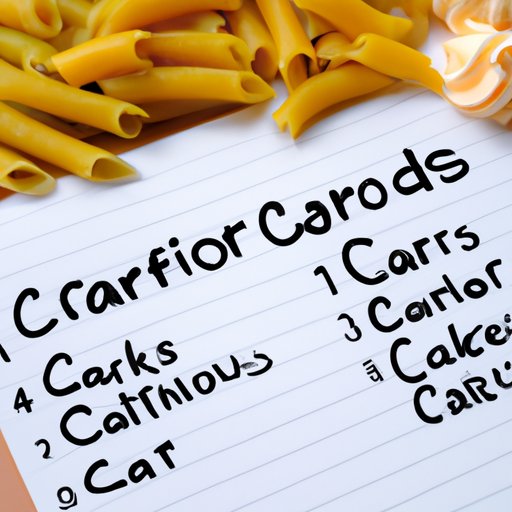Introduction
If you’re trying to eat a healthy diet, understanding how many carbs to eat a day is crucial. Carbohydrates, or carbs, are a primary source of energy for the body, but it’s important to maintain a balance in the amount of carbs you consume every day. Eating too few carbs can cause fatigue and other health problems, and eating too many can lead to weight gain and other potential health risks.
This comprehensive guide discusses everything you need to know about carbs, including what they are, how much you need, and the health risks associated with consuming too many or too few. It also includes tips for tracking your carb intake, a list of healthy high-carb foods, and delicious low-carb recipes to try.
What are Carbs and Why Do You Need Them?
Carbohydrates are macronutrients that are found in many different types of food. They are made up of sugar molecules that are broken down and used for energy by the body.
Carbs are important because they provide energy and nutrients for the body. They are also essential for brain function and other bodily processes. The body can break down carbs into glucose, which is used by the cells for energy.
There are different types of carbohydrates, including simple and complex, refined and unrefined, and fiber and sugar. Simple carbs are found in foods like fruit and milk, while complex carbs are found in foods like beans, whole grains, and vegetables. Refined carbs are found in foods like white bread and pasta, while unrefined carbs are found in foods like brown rice and quinoa. Fiber is a type of carb that is important for digestive health, while sugar is often added to foods and drinks for flavor.
How Many Carbs Should You Eat a Day?
The number of carbs you need depends on a variety of factors, including your age, sex, weight, activity level, and health conditions.
The recommended daily carb intake varies depending on your goals and needs. For example, athletes and active individuals may need more carbs for energy, while people with diabetes may need to limit their carb intake.
For most adults, the recommended daily carb intake is between 225 and 325 grams per day. Children, teens, and pregnant or nursing women may need more or fewer carbs, depending on their specific needs.
Calculating your daily carb needs can be done by using an online carb calculator, or by working with a nutritionist or qualified healthcare provider. This can help you find a balance that works for your individual needs and goals.
Tips for Tracking Your Carb Intake
Tracking your carb intake is essential for ensuring that you meet your daily goals. There are many different ways to track your carb intake, including using a food journal, downloading a carb tracking app, or using online resources such as nutrient databases or calculators.
Some tips for tracking your carb intake include setting daily goals, measuring portion sizes, and reading food labels carefully. It is also important to track not only the number of carbs you consume but also where they come from, such as fruits, vegetables, grains, or sweets.
Health Risks Associated with Carbohydrate Consumption
Consuming too many or too few carbs can have negative health consequences. For example, consuming too many carbs can lead to weight gain, increased blood sugar levels, and risk of heart disease. On the other hand, consuming too few carbs can cause fatigue, dizziness, and other health issues.
To reduce health risks, it is important to find a balance that works for you. This might involve limiting your carb intake, choosing healthier high-carb foods, or reducing the amount of sugar and refined carbs in your diet.
List of High-Carb Foods to Choose or Avoid
While it’s important to get enough carbs in your diet, you should avoid consuming unhealthy high-carb foods that are often low in nutrients. Examples of these foods include sugary drinks, sweets, and processed grains.
Instead, you should choose healthy high-carb foods that are rich in nutrients and fiber. Examples of these foods include fruits, vegetables, whole grains, and legumes.
Delicious Low-Carb Recipes to Try
If you’re looking for delicious low-carb recipes, there are many options available. Some examples include:
– Baked avocado eggs
– Grilled shrimp and vegetable kebabs
– Cauliflower crust pizza
– Zucchini noodles with pesto
– Chocolate avocado mousse
Conclusion
The right amount of carbs in your diet can help you maintain optimal health and energy levels. By following the tips and information in this guide, you can learn how to find the right balance of carbs in your daily intake. Remember, it’s important to listen to your body and make adjustments as needed to find a sustainable and healthy balance. Don’t hesitate to seek the advice of a qualified healthcare provider or nutritionist if you have specific questions or concerns.
